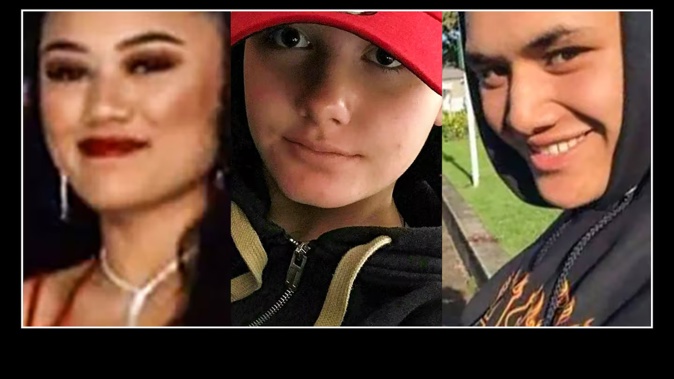

- A four-week coroner’s inquest is under way in Whangārei into the suspected suicides of six youths in 2018 and 2020.
- Hamuera Ellis-Erihe, 16, of Raumanga died in 2018. He loved dancing, rapping and singing.
- Summer Mills-Metcalf, 14, of Kaipara, died in 2018. She was described as a happy, smiling girl who enjoyed pulling pranks on family members.
- Ataria Heta, 16, of Moerewa died in 2020. She was a stand-out kapa haka performer with a kind nature.
- Maaia Reremoana Marshall, 14, of Kaitāia died in 2018 after being under the care of Oranga Tamariki.
- Evidence is also being presented for teenagers Martin Loeffen Romagnoli and James Patira Murray.
WARNING: This article discusses suicide and sexual assault and may be upsetting to some readers
A 14-year-old girl who scored high on an Oranga Tamariki suicide risk screening three times had her file closed by the agency and then disappeared off its radar.
Four months later, she died from a suspected suicide after she had returned, without Oranga Tamariki’s knowledge, to the address from which she had been uplifted.
Now, the death of Maaia Reremoana Marshall is under inquiry by Northland Coroner Tania Tetitaha along with five other youths who died in 2018 and 2020.
Coroner Tetitaha, who said she would find at the end of the inquest that the rangatahi died by suicide, was seeking solutions to impediments in accessing suicide prevention services in the North.
Family members for Marshall did not attend the coroner’s hearing in Whangārei this week, but Oranga Tamariki officials were there to provide evidence.
Marshall had a long history with the state’s child protective services with records dating back to when she was 16 months old.
In 2017, she was living with her mother and siblings in Northland when she told a teacher she was having suicidal thoughts.
The coroner’s court heard a report of concern (ROC) was lodged with Oranga Tamariki by her school on October 25 of that year and the following day a suicide risk screening took place.
The Kessler and Suicide screening (SKS) practice used by Oranga Tamariki assesses whether a youth is dealing with substance abuse issues, suffering from psychological distress, or at risk of death by suicide.
Marshall’s SKS results were more than eight, the national minimum, which automatically triggered a referral to the Oranga Tamariki youth suicide intervention programme, Towards Wellbeing.
Following issues raised within her home, Marshall was uplifted from her mother’s and moved to Oranga Tamariki caregivers. She was later moved to her paternal grandparents in the Waikato on a 28-day interim custody order.
No records of information
On November 17, Towards Wellbeing told Oranga Tamariki that Marshall had been accepted into the programme but the court heard there was no record of that information being passed on to Marshall or her whānau.
A month later, another suicide risk assessment took place and Marshall returned an extremely high score of 19.
Although the result was entered into the national Oranga Tamariki database, the social worker did not update the transcript of conversations with Marshall.
Oranga Tamariki had been involved with the care of Maaia Marshall since she was very young. Photo / RNZ
On January 18, 2018, a whānau hui was called and Marshall, her grandparents and an uncle and aunty put in place goals to help her remain in the permanent care of her grandparents and to attend counselling and school.
The court heard the interim custody order had lapsed and there was no record of a new order.
On March 15, another suicide screening was conducted and Marshall was scored at 11.
Towards Wellbeing emailed the Oranga Tamariki social worker and gave guidance around safety issues related to Marshall and resources to share with her grandparents.
However, again, there was no evidence that information was passed on to the whānau.
Around two months later, the social worker in charge of Marshall’s file concluded the whānau agreements concerning living, school and counselling arrangements had been reached and closed her file.
But later in the year, a Northland police officer found she was living back at her mother’s address, from which she had previously been uplifted, and raised concerns.
The constable reportedly called an Oranga Tamariki social worker but in an email, which was presented in court, was told “because her file was closed, there is nothing Oranga Tamariki can do”.
This alert was not recorded or actioned by Oranga Tamariki and Marshall died from a suspected suicide on September 14, 2018, while living at her mother’s.
‘The bottom line is, OT should have known’
At the inquest, senior delivery adviser for Oranga Tamariki Melissa Knowltan began her evidence by offering condolences to the whānau of Marshall before highlighting key areas where the service had failed the teen.
Knowltan said although the initial response from Oranga Tamariki was swift, the follow-up and regulation could have been better.
“In my practice and experience, it would be really unfortunate if Oranga Tamariki did say there was nothing we could do knowing it was a complete change of circumstances and she was back in the environment where we first became involved.
“The bottom line is, OT should have known Maaia had moved to the North.”
Northland Coroner Tania Tetitaha questioned Oranga Tamariki officials about their involvement with Maaia Marshall.
Knowltan said a family group conference should have been called rather than a whānau hui and Oranga Tamariki should have remained engaged.
“The onus was agreed to be left with the whānau. In hindsight, it would have been more appropriate for Oranga Tamariki to stay involved in supporting Maaia and her whānau.
“It’s fair to say there were outstanding tasks that could have been done better.”
Coroner Tetitaha asked Knowlton if the whānau agreement had any detail on what would happen if the custody arrangement failed.
“It didn’t,” Knowlton responded.
The coroner said there were several agencies connected with Marshall however none of them were sharing information accordingly.
She said it seemed “all the pieces of information” were not “joined up” and an aligned approach had not been taken, Coroner Tetitaha said.
“How do we fix that?” she asked. “The reason I look at Oranga Tamariki is you have substantive powers and one of the powers you have is requiring sharing information.
“You are the central agency that could reach into other agencies and provide them the information and support they need, you can do what no other agency can do.”
Oranga Tamariki is expected to give evidence relating to two other youths, James Patira Murray and Martin Loeffen Romagnoli, whose deaths are being considered as part of the inquest.
SUICIDE AND DEPRESSION
Where to get help:
• Lifeline: Call 0800 543 354 or text 4357 (HELP) (available 24/7)
• Suicide Crisis Helpline: Call 0508 828 865 (0508 TAUTOKO) (available 24/7)
• Youth services: (06) 3555 906
• Youthline: Call 0800 376 633 or text 234
• What's Up: Call 0800 942 8787 (11am to 11pm) or webchat (11am to 10.30pm)
• Depression helpline: Call 0800 111 757 or text 4202 (available 24/7)
• Helpline: Need to talk? Call or text 1737
• Aoake te Rā (Bereaved by Suicide Service): Call 0800 000 053
If it is an emergency and you feel like you or someone else is at risk, call 111.
Shannon Pitman is a Whangārei-based reporter for Open Justice covering courts in the Te Tai Tokerau region. She is of Ngāpuhi/ Ngāti Pūkenga descent and has worked in digital media for the past five years. She joined NZME in 2023.

Take your Radio, Podcasts and Music with you








